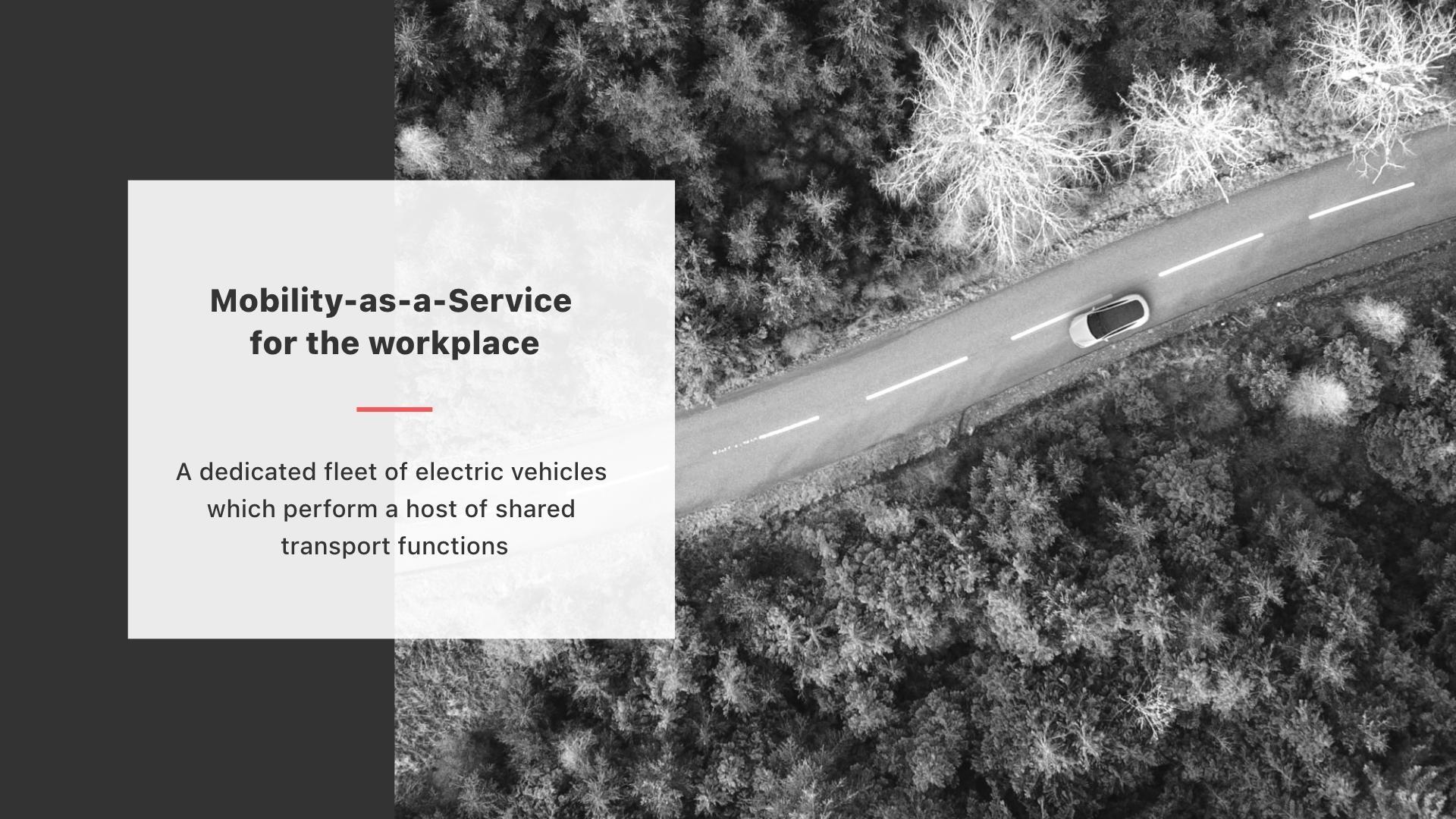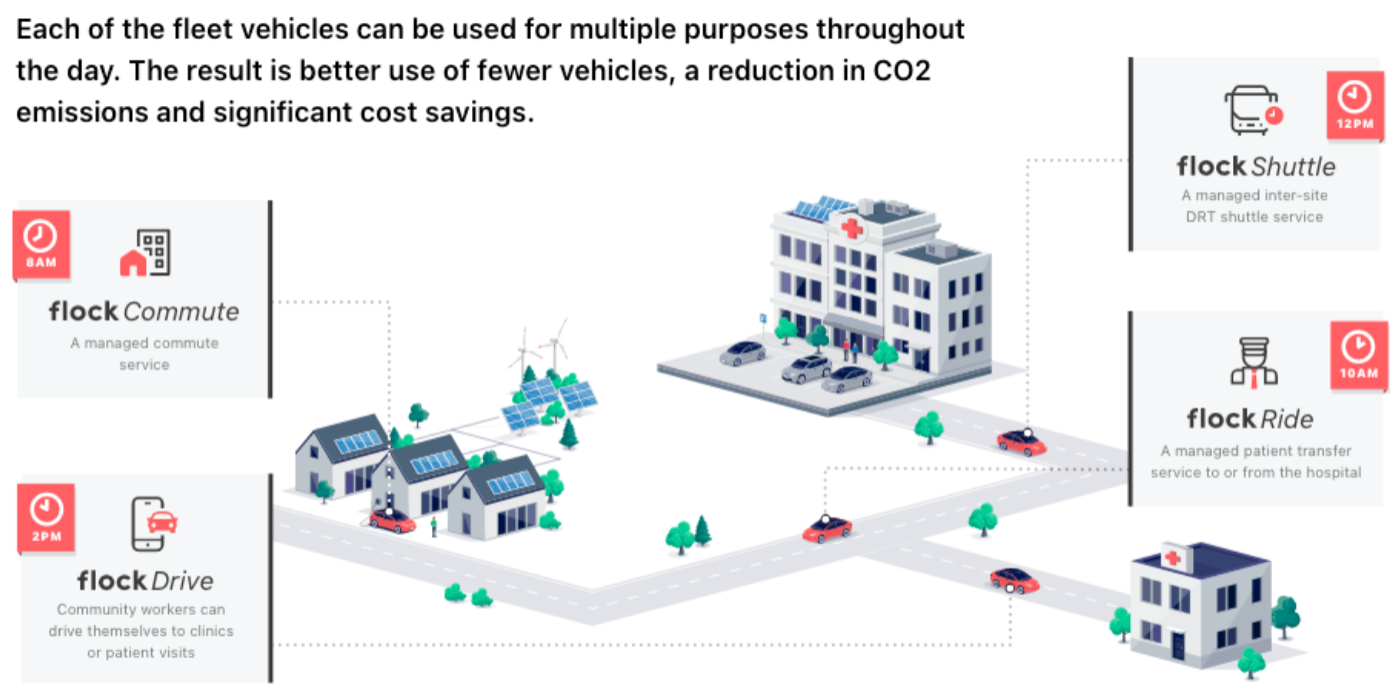
Objectives of the service

Objectives:
-
Helped Newcastle Hospitals NHS Foundation Trust reduce transport emissions and meet their net zero targets
-
Saved money for the NHS by consolidating services and making better use of fewer vehicles
-
Demonstrated the real world deployment of an electric vehicle self-drive, patient transport, medical equipment delivery, and demand responsive shuttle service
Users and their needs
Flock Mobility introduced an innovative software platform to the healthcare and private residential sector designed to optimise electric vehicle fleets for both NHS staff and patients, and new residential development residents reducing costs, enhancing access, and helping the NHS and the residential housing developers achieve their Net Zero targets.
The key user segments targeted in the pilot were:
-
NHS employees of the Newcastle Upon Tyne Hospital Trust who need reliable transport to and from community based appointments
-
NHS patients of the Newcastle Upon Tyne Hospital Trust who need reliable transport to and from dialysis treatment
-
Residents (prospective and current) of Berkeley developments who need access to key facilities without the need to own a private car
-
Marketing staff at Berkeley developments who need a presentable and green means of transport to use with prospective residents for tours to, from and around the new development
For the project to meet the needs of the users the optimal number of electric vehicle and driver assets deployed in order to provide an attractive, flexible enough service to staff, residents and patients whilst also utilising the NHS Trust and housing developer mobility budgets efficiently.
Service/ system concept

The Flock service ensured the use of each electric vehicle deployed is maximised and benefits as many users as possible by enabling multiple sharing options in a novel and user-friendly approach. The service was powered by unique shared mobility functionality that enables each vehicle to be used dynamically in four ways:
-
A dynamic door-to-door patient transport service (powered by Flock Commute functionality) provided better access to hospitals for patients who required transport to and from routine treatment appointments.
-
As the door-to-door patient transport service was only required at certain times of the day, the same vehicle fulfilled deliveries of medical equipment to patients homes during downtime.
-
Other vehicles were configured to provide the Flock Shuttle service to residents of a new residential development. The demand-responsive shuttle service offered transfers to the nearby train station and business offices. Residents downloaded the Flock Rider App and booked a seat on a scheduled shuttle service. 15min prior to the start of the scheduled service users received a notification with updated pick up time based on re-optimisation of requested stops.
-
Another fleet of vehicles, configured for the self-drive service were made available to NHS Staff at three locations. Authorised NHS staff booked and then accessed the vehicles using a smartphone application and gained instant access if the vehicle was available. Keyless entry on the vehicles allowed the vehicle to be accessed via the app and enabled the tracking of pool car utilisation and availability automatically.
The system worked by feeding the requests from multiple users made in the passenger app (ride pickup point, destination, required arrival time etc) into a ‘logistics module’. The logistics module then calculated the best way to use the available vehicles and drivers to provide as many rides as possible to the passengers. The driver app showed each driver where they have to go to pick up passengers along a calculated route optimised for maximum vehicle utilisation. Global navigation satellite systems (GNSS) allowed the Flock system to accurately show the riders where their driver is in real time (via the Vehicle tracker component) and showed the drivers where specifically a rider is in real time (via the passenger’s mobile device). The GNSS also allowed the Flock system to determine when a passenger is actually in the vehicle automatically so that users and drivers don’t have to manually confirm they are in the vehicle.
Space Added Value
Satellite Navigation technologies were used in this project so that we achieved an understanding of the current location of vehicles and individuals and optimised our routing system as a result of accurate real-time location information and routing data. The global navigation satellite system (GNSS) was utilised for this system for acceptable coverage on an international basis. The system used pervasive technologies and devices that are compatible with GNSS. EGNOS broadcast satellite data was received directly to the smartphone if supported by the user’s device. This level of accuracy enabled us to achieve critical functional capabilities including: automatic passenger vehicle onboarding detection, automatic driver arrival messaging and accurate real-time driver route navigation. A vehicle tracker was important as a back-up mechanism for smartphone-based GNSS. The vehicle tracker provided real-time and historical location data for each deployed vehicle via an installed IoT device on each vehicle in the fleet.
Current Status
- The CCN1 phase of Project ECLIPSE has now formally commenced following countersignature in December 2025. Initial activities have focused on project mobilisation, coordination with ESA, and preparation for full technical delivery of the CCN1 enhancements.
- Work has been undertaken on the NHS-facing administrative interface to support inclinic readiness updates, informed by prior operational feedback and user research.
- Full delivery activities in the technical work packages are now underway, with implementation of the remaining CCN1 work packages progressing in line with a revised schedule.
- The project is currently preparing for the Acceptance Test and remains on track to deliver the agreed enhancements to support real-time operational flexibility within NHS patient transport services.



